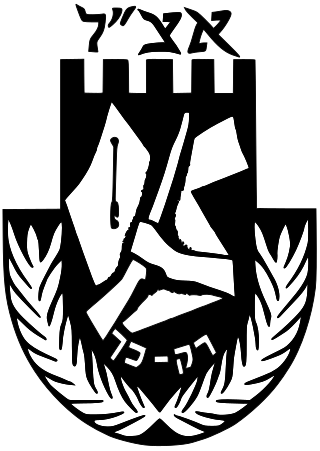
The Irgun, or Etzel, was a Zionist paramilitary organization that operated in Mandate Palestine and then Israel between 1931 and 1948. It was an offshoot of the older and larger Jewish paramilitary organization Haganah. The Irgun has been viewed as a terrorist organization or organization which carried out terrorist acts.

Lehi, often known pejoratively as the Stern Gang, was a Zionist paramilitary militant organization founded by Avraham ("Yair") Stern in Mandatory Palestine. Its avowed aim was to evict the British authorities from Palestine by use of violence, allowing unrestricted immigration of Jews and the formation of a Jewish state. It was initially called the National Military Organization in Israel, upon being founded in August 1940, but was renamed Lehi one month later. The group referred to its members as terrorists and admitted to having carried out terrorist attacks.

Zionism is a nationalist movement that emerged in the 19th century to espouse support for the establishment of a homeland for the Jewish people in Palestine, a region roughly corresponding to the Land of Israel in Jewish tradition. Following the establishment of Israel, Zionism became an ideology that supports "the development and protection of the State of Israel".
Haganah was the main Zionist paramilitary organization that operated for the Yishuv in the British Mandate for Palestine. It was founded in 1920 to defend the Yishuv's presence in the region, and was formally disbanded in 1948, when it became the core force integrated into the Israel Defense Forces shortly after the Israeli Declaration of Independence.

Chaim Azriel Weizmann was a Russian-born biochemist, Zionist leader and Israeli statesman who served as president of the Zionist Organization and later as the first president of Israel. He was elected on 16 February 1949, and served until his death in 1952. Weizmann was fundamental in obtaining the Balfour Declaration and later convincing the United States government to recognize the newly formed State of Israel.

Herbert Louis Samuel, 1st Viscount Samuel, was a British Liberal politician who was the party leader from 1931 to 1935.

Revisionist Zionism is a form of Zionism which is characterized by territorial maximalism. Revisionist Zionism promoted expansionism and the establishment of a Jewish majority on both sides of the Jordan River.

Shlomo Ben-Yosef was a member of the Revisionist Zionist underground group Irgun. He is most noted for his participation in an April 21, 1938, attack on a bus carrying Arab civilians, intended as a retaliation for an earlier attack by Arabs against Jews, and emblematic as a rejection of the establishment policy of Havlagah, or restraint. For this reason, and especially for having been the first Jew executed by the British authorities during the mandate period, Ben-Yosef became a martyr for the Revisionist cause and is commemorated by the State of Israel as one of 12 Olei Hagardom.

Shlomo Yosef Burg was a German-born Israeli politician. In 1949, he was elected to the first Knesset, and served in many ministerial positions for the next 40 years. He was one of the founders of the National Religious Party.

From 1951 to 1952, Operation Ezra and Nehemiah airlifted between 120,000 and 130,000 Iraqi Jews to Israel via Iran and Cyprus. The massive emigration of Iraqi Jews was among the most climactic events of the Jewish exodus from the Muslim World.

Musa Kazim Pasha al-Husayni held a series of senior posts in the Ottoman administration. He belonged to the prominent al-Husayni family and was mayor of Jerusalem (1918–1920). He was dismissed as mayor by the British authorities and became head of the nationalist Executive Committee of the Palestine Arab Congress from 1922 until 1934. His death was believed to have been caused by injuries received during an anti-British demonstration.

Abba Ahimeir was a Russian-born Jewish journalist, historian, and political activist. One of the ideologues of Revisionist Zionism, he was the founder of the Revisionist Maximalist faction of the Zionist Revisionist Movement (ZRM) and of the clandestine Brit HaBirionim.
As an organized nationalist movement, Zionism is generally considered to have been founded by Theodor Herzl in 1897. However, the history of Zionism began earlier and is intertwined with Jewish history and Judaism. The organizations of Hovevei Zion, held as the forerunners of modern Zionist ideals, were responsible for the creation of 20 Jewish towns in Palestine between 1870 and 1897.

Nathan Yellin-Mor was a Revisionist Zionist activist, Lehi leader and Israeli politician. In later years, he became a leader of the Israeli peace camp, a pacifist who supported negotiations with the Palestine Liberation Organization and concessions in the Israeli-Arab conflict.
Revisionist Maximalism was a short-lived movement right-wing militant political ideology and Jewish militant ideology which was part of the Brit HaBirionim faction of the Zionist Revisionist Movement (ZRM) created by Abba Ahimeir.
Joseph Berger-Barzilai was a founding member and the secretary of the Communist Party of Palestine and a Comintern official in Soviet who fell victim to Stalin's purges.

Poale Zion was a movement of Marxist–Zionist Jewish workers founded in various cities of Poland, Europe and the Russian Empire at about the turn of the 20th century after the Bund rejected Zionism in 1901.

Ya'akov Zerubavel was a Jewish Zionist activist, writer, publisher, and one of the leaders of the Poale Zion movement.

Meir Nakar was an Irgun member in pre-state Mandatory Palestine and one of 12 Olei Hagardom.

The 1929 Palestine riots, Buraq Uprising or the Events of 1929, was a series of demonstrations and riots in late August 1929 in which a longstanding dispute between Muslims and Jews over access to the Western Wall in Jerusalem escalated into violence.















